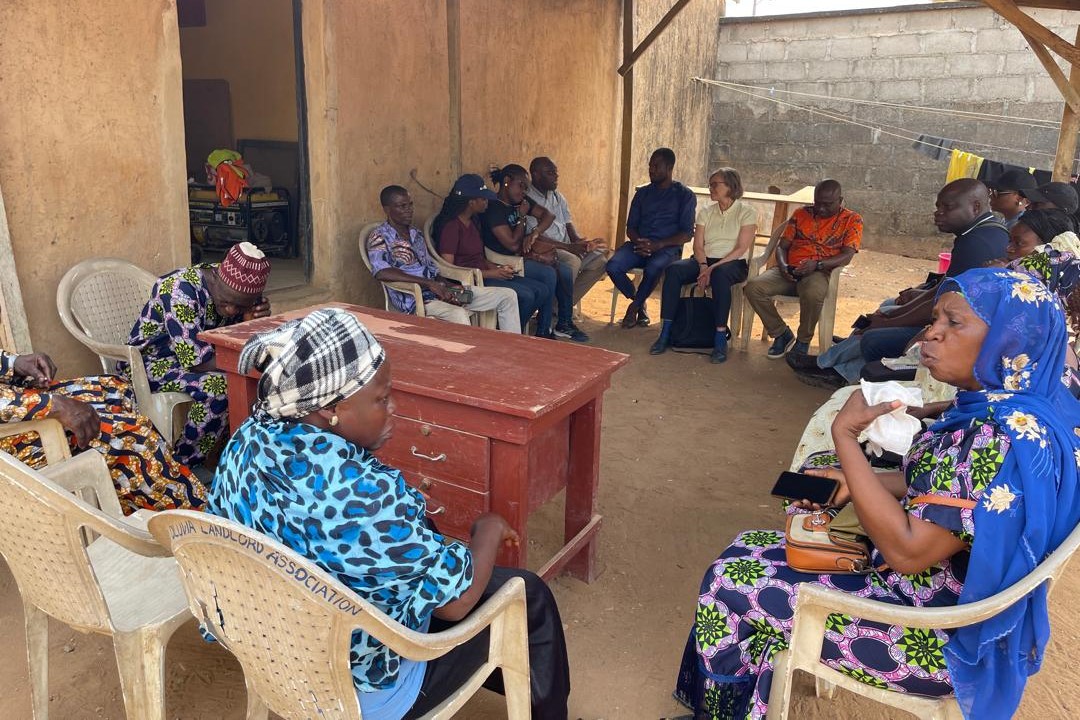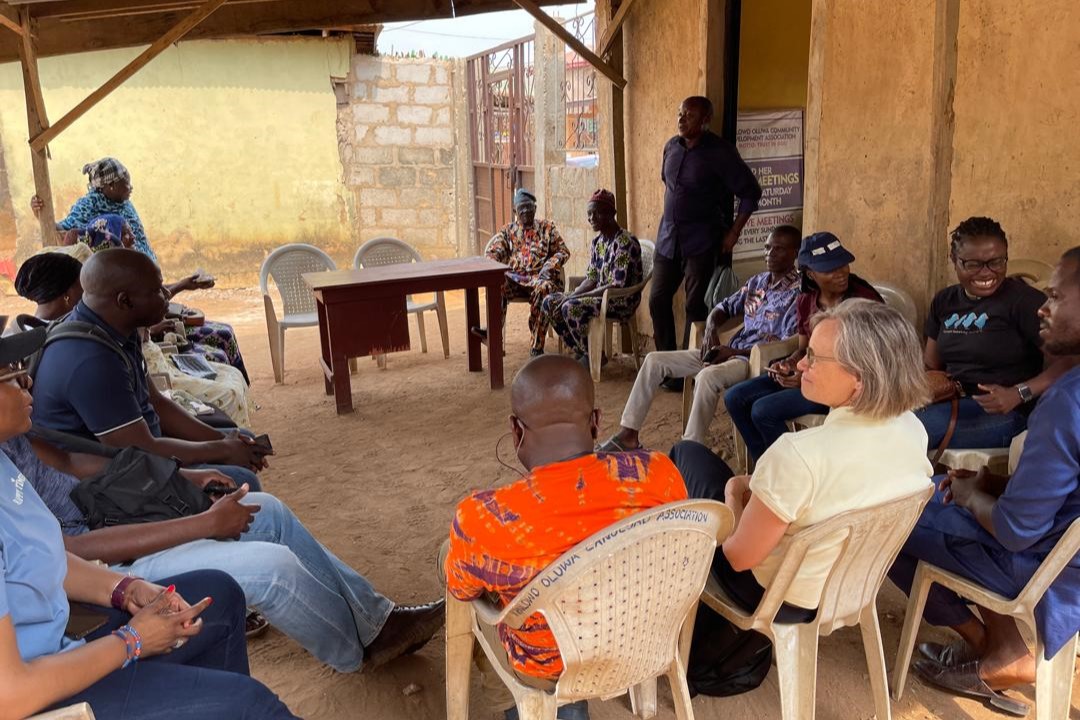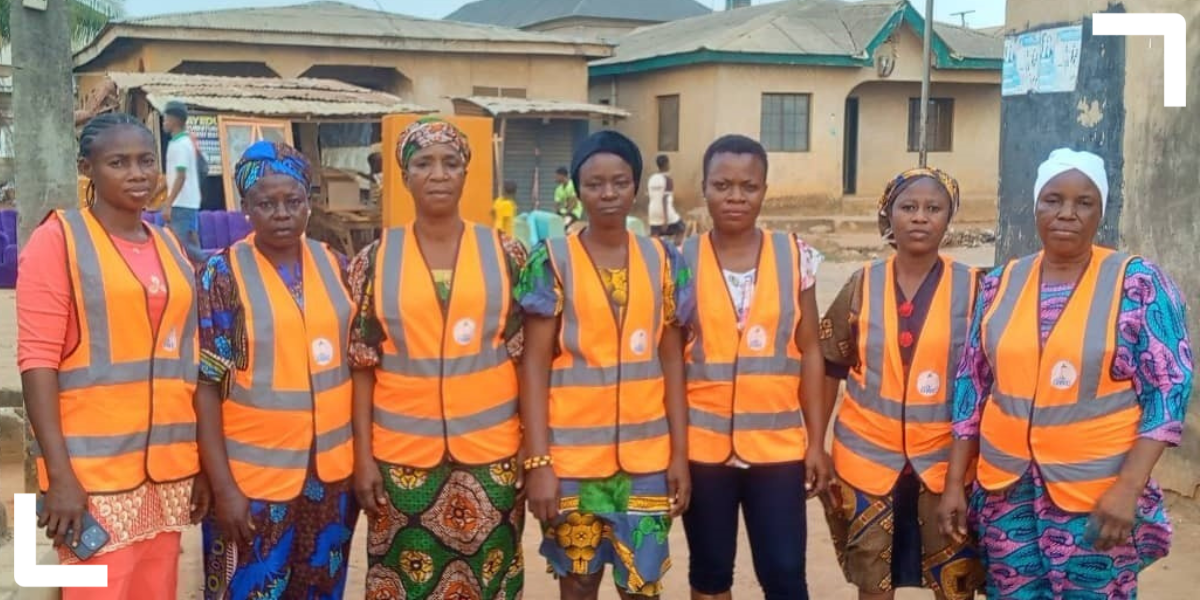By Rasheed Shittu and Oluwaseun Muraina
Informal settlements across Africa are often framed as problems – places of disorder, crime and dysfunction. Yet these communities are also spaces of resilience, agency and ingenuity, where informal solutions are devised to fill gaps left by inadequate formal service provision and infrastructure.
The “Informal Settlements as Spaces of Transformative Agency” project focuses on the Okerube community in Lagos to challenge dominant narratives and demonstrate how bottom-up, community-led governance models can deliver sustainable and inclusive water, sanitation and hygiene (WASH) solutions in informal urban settlements.
As part of ACRC’s action research portfolio, this project aims to address one of the most pressing challenges in Lagos’s informal settlements: inadequate access to clean water and sanitation, which is a result of systemic state inefficiencies.
Okerube, located in the Alimosho Local Government Area of Lagos, is a densely populated community. Like many such communities, it is characterised by a lack of public infrastructure, overreliance on unregulated water vendors and a sanitation crisis, resulting in widespread open defecation and public health risks. Rather than proposing another top-down solution, this project adopts an alternative approach that leverages community participation and resources critical to mobilising the right kind and level of political engagement.
It connects existing community-based structures, such as women’s water and sanitation committees and Community Development Associations (CDAs), to develop a sustainable, gender-responsive WASH infrastructure model. The focus is not only on technical delivery but also on embedding governance, finance and gender considerations to ensure long-term resilience and equity.

Co-producing a replicable community model
The overarching goal of the initiative is to develop a replicable, community-led model for sustainable water and sanitation infrastructure that integrates social enterprise financing, inclusive governance and systemic policy engagement. By proving the viability of this model in Okerube, the project aims to serve as a proof of concept for scaling similar interventions across Lagos and other African cities.
Importantly, the project views informal settlement residents not as passive beneficiaries, but as active agents of change. By demonstrating what is possible when communities lead, the project contributes to a reimagining of urban development – one that is inclusive, resilient and just. Ultimately, the project seeks to achieve the following objectives:
> Improve water and sanitation service delivery in Okerube through participatory planning and infrastructure development.
> Empower women as key governance actors by strengthening the capacity and legitimacy of existing women-led WASH committees.
> Test and document a scalable water and sanitation social enterprise model that can be replicated in other informal settlements.
> Address systemic barriers to water and sanitation access by engaging with local political and governance institutions.
> Bridge formal and informal governance structures, ensuring integration rather than replacement of local innovations.
Our bottom-up approach to change
The implementation strategy combines action research, capacity building, policy engagement and community advocacy over a period of 15 months. The project will be implemented in four selected CDAs within Okerube: Iranlowo-Oluwa, Ifesowapo, Ona-Ara and Ogo Oluwa. These areas represent the densest population clusters and commercial hubs, with an estimated combined population of 600,000 people. To operationalise this initiative, the project seeks to undertake:
> Participatory mapping: Using GIS and community transect walks to document existing water points, sanitation facilities and governance actors.
> Infrastructure development: Constructing dual-purpose facilities – boreholes with public toilets managed by women’s committees.
> Capacity building: Training women’s water and sanitation committees in system maintenance, financial management and advocacy.
> Peer exchange: Learning from successful models in other Nigerian states and countries.
> Advocacy and public engagement: Highlighting community voices through media and engaging stakeholders at the city and local government levels.

A multi-layered approach will be adopted to ensure a holistic and context-responsive solution to the complex urban WASH challenges facing the CDAs. This approach integrates targeted interventions aimed at establishing:
1. Community governance: Empowering CDAs and women-led water and sanitation committees to act as formal governance actors. Their inclusion in decision-making will drive equity and accountability in service provision.
2. Social enterprise model: Moving beyond charity-based water and sanitation provision, the project will introduce a financially sustainable model. Revenue from water and sanitation services will be reinvested in operations and community initiatives. Options like “pay-per-use” or tiered payment systems will be tested.
3. Infrastructure resilience: Boreholes will be connected to multiple distribution points to enhance access and reduce dependency on failing facilities.
4. Gender mainstreaming: Women and girls disproportionately bear the burden of inadequate WASH services, ranging from exposure to gender-based violence and school absenteeism. This project ensures their leadership and protection are built into all phases of planning and implementation.
5. Policy and institutional engagement: Working with local governments and agencies such as the Lagos State Water Regulatory Commission (LASWARCO), the project aims to influence WASH policy and foster city-level uptake of successful models.
6. Documentation and learning: Findings will be documented through community storytelling, photography and academic reporting. These will inform broader ACRC learning and contribute to city-wide and regional policy dialogues.
Contribution to broader wash reforms in Lagos
This initiative is timely, aligning with ongoing urban reforms, including Nigeria’s devolution of funding to local governments and Lagos State’s recently launched WASH Policy and Implementation Plan. It also builds on the lessons of past donor-led WASH efforts that failed due to inadequate community involvement or lack of maintenance planning.
The project contributes to a broader rethinking of how African cities can leverage local agencies for systemic reform. As such, this is not just a WASH project, but a governance and empowerment intervention with the potential to redefine how infrastructure is delivered in some of the most underserved parts of the urban world. By drawing on local knowledge, embracing innovation and confronting structural inequities, the Okerube project offers a hopeful blueprint for a more inclusive urban future.
Photo credits: Rasheed Shittu. Okerube Women Water Committee and an ACRC community engagement in Okerube, Lagos.
Note: This article presents the views of the authors featured and does not necessarily represent the views of the African Cities Research Consortium as a whole.
The African Cities blog is licensed under Creative Commons Attribution-NonCommercial-NoDerivatives 4.0 International (CC BY-NC-ND 4.0), which means you are welcome to repost this content as long as you provide full credit and a link to this original post.


